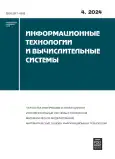On the Project of an Effective Software Platform for Working with Genetic Data of Respiratory Viruses
- Autores: Mordvinov A.V.1, Stuchinsky A.V.1,2, Devyaterikov A.P.1, Khayrulin S.S.1, Palyanova N.V.3, Palyanov A.Y.1,2,3
-
Afiliações:
- A.P. Ershov Institute of Informatics Systems, Siberian Branch of the Russian Academy of Sciences
- Novosibirsk State University
- Research Institute of Virology, Federal Research Center for Fundamental and Translational Medicine, Siberian Branch of the Russian Academy of Sciences
- Edição: Nº 4 (2024)
- Páginas: 60-73
- Seção: Information processing and data analysis
- URL: https://bakhtiniada.ru/2071-8632/article/view/286417
- DOI: https://doi.org/10.14357/20718632240406
- EDN: https://elibrary.ru/EUCRNU
- ID: 286417
Citar
Resumo
Progress in sequencing technologies, i.e. reading the nucleotide sequences of living organisms, has led to a rapid growth of the amount of genetic data. The largest global projects that accumulate this information and provide online access to it are Genbank and GISAID. Also they provide basic capabilities for analyzing this data online, but they are quite limited. This significantly limits our abilities to effectively solve a number of scientific problems and tasks, so we decided to develop our own domestic (Russian) web platform with capabilities which we need. The main goal of this project is to provide a team of researchers with the opportunity to effectively solve problems in bioinformatics, virology and epidemiology, based on modern, effective, reasonably selected software solutions operating with high performance and providing many useful functionalities which can be extended by adding new necessary programs for analyzing and modeling. The web platform we are implementing will allow to download, store, search and analyze genomic sequences of viruses, such as influenza, SARS-CoV-2 and, in perspective, other viral pathogens. In addition, the project will develop and advance through efforts of IT part of our team taking into account actual needs of bioinformaticians and virologists. We plan to make it available to researchers around the world and periodically update both the software and the data (from open sources) to improve the convenience and efficiency for scientists working in the relevant areas.
Palavras-chave
Sobre autores
Alexander Mordvinov
A.P. Ershov Institute of Informatics Systems, Siberian Branch of the Russian Academy of Sciences
Autor responsável pela correspondência
Email: a.mordvinov@g.nsu.ru
Ph.D. student, assistant at the Department of Informatics Systems, Faculty of Information Technologies
Rússia, NovosibirskArseny Stuchinsky
A.P. Ershov Institute of Informatics Systems, Siberian Branch of the Russian Academy of Sciences; Novosibirsk State University
Email: a.stuchinskii@g.nsu.ru
software engineer, postgraduate student of the Department of Programming, the Faculty of Mechanics and Mathematics
Rússia, Novosibirsk; NovosibirskAnton Devyaterikov
A.P. Ershov Institute of Informatics Systems, Siberian Branch of the Russian Academy of Sciences
Email: a.devyaterikov@g.nsu.ru
Ph.D. student, software engineer
Rússia, NovosibirskSergey Khayrulin
A.P. Ershov Institute of Informatics Systems, Siberian Branch of the Russian Academy of Sciences
Email: s.khayrulin@gmail.com
junior researcher
Rússia, NovosibirskNatalia Palyanova
Research Institute of Virology, Federal Research Center for Fundamental and Translational Medicine, Siberian Branch of the Russian Academy of Sciences
Email: natalia.palyanova@gmail.com
junior researcher
Rússia, NovosibirskAndrey Palyanov
A.P. Ershov Institute of Informatics Systems, Siberian Branch of the Russian Academy of Sciences; Novosibirsk State University; Research Institute of Virology, Federal Research Center for Fundamental and Translational Medicine, Siberian Branch of the Russian Academy of Sciences
Email: palyanov@iis.nsk.su
Doctor of physics and mathematics, director; researcher; senior lecturer at the Department of Programming, Faculty of Mechanics and Mathematics
Rússia, Novosibirsk; Novosibirsk; NovosibirskBibliografia
- Bogner P., Capua I., Lipman D.J., Cox N.J. A global initiative on sharing avian flu data // Nature. 2006. № 442(7106), С. 981. https://doi.org/10.1038/442981a
- Farley M.M. 2009 H1N1 influenza: a twenty-first century pandemic with roots in the early twentieth century // Am. J. Med. Sci. 2010. № 340(3), С. 202-208. https://doi.org/10.1097/MAJ.0b013e3181e937b0
- Tanner W.D., Toth D.J., Gundlapalli A.V. The pandemic potential of avian influenza A(H7N9) virus: a review // Epidemiol. Infect. 2015. № 143(16), С. 3359-3374. https://doi.org/10.1017/S0950268815001570.
- Martellucci C.A., Flacco M.E., Cappadona R., Bravi F., Mantovani L., Manzoli L. SARS-CoV-2 pandemic: An overview // Advances in Biological Regulation. 2020. № 77, С. 100736. https://doi.org/10.1016/j.jbior.2020.100736
- Si Y., Wu W., Xue X., Sun X., Qin Y., Li Y., Qiu C., Li Y., Zhuo Z., Mi Y., Zheng P. The evolution of SARS-CoV-2 and the COVID-19 pandemic // PeerJ. 2023. № 11, С. e15990. https://doi.org/10.7717/peerj.15990.
- Lenharo M. GISAID in crisis: can the controversial COVID genome database survive? // Nature. 2023. № 617(7961), С. 455-457. https://doi.org/10.1038/d41586-023-01517-9
- https://microbius.ru/news/gisaid-v-krizise-smozhet-li-vyzhit-vyzyvayuschaya-spory-baza-dannyh-genomov-covid
- Sayers E.W., Cavanaugh M., Clark K., Pruitt K.D., Schoch C.L., Sherry S.T., et al. GenBank // Nucleic Acids Res. 2022. №50(D1), С. D161-D164. https://doi.org/10.1093/nar/gkab1135.
- Sayers E.W., Cavanaugh M., Clark K., Pruitt K.D., et al. GenBank 2024 Update // Nucleic Acids Research. 2024. № 52(D1), С. D134–D137. https://doi.org/10.1093/nar/gkad903.
- Wu F., Zhao S., Yu B., Chen Y.M., Wang W., et al. A new coronavirus associated with human respiratory disease in China // Nature. 2020. № 579(7798), С. 265-269. https://doi.org/10.1038/s41586-020-2008-3.
- http://courseware.cutm.ac.in/wp-content/uploads/2020/10/ Gen-Bank.pdf.
- Pertsemlidis A., Fondon J.W. Having a BLAST with bioinformatics (and avoiding BLASTphemy) // Genome Biology. 2001. № 2(10), С. reviews2002.1. https://doi.org/10.1186/gb-2001-2-10-reviews2002
- Aksamentov I., Roemer C. et al. Nextclade: clade assignment, mutation calling and quality control for viral genomes // J. Open Source Software. 2021. № 6(67), С. 3773. https://doi.org/10.21105/joss.03773.
- Ahdritz G., Bouatta N., Floristean C., Kadyan S., et al. OpenFold: retraining AlphaFold2 yields new insights into its learning mechanisms and capacity for generalization // Nature Methods. 2024. №21(8), C. 1514-1524. https://doi.org/10.1038/s41592-024-02272-z.
- Devyaterikov A.P., Palyanov A.Yu. Acceleration of recombinant viral sequences search by 3SEQ algorithm via adding support of multi-threaded calculations and considering sample collection dates // Mathematical Biology and Bioinformatics. 2024. № 19(2), С. 338-353. https://doi: 10.17537/2024.19.338. https://github.com/NotNa19/RecombinantDetector.
- Lam H.M., Ratmann O. and Boni M.F. Improved algorithmic complexity for the 3SEQ recombination detection algorithm // Mol. Biol. Evol. 2018. №35, С. 247–251. https://doi.org/10.1093/molbev/msx263.
Arquivos suplementares









